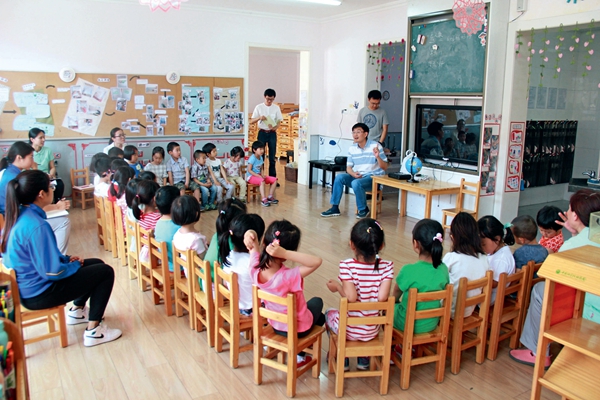Science learning starts in childhood
- By Liu Sufang and Zhou Lin
 0 Comment(s)
0 Comment(s) Print
Print E-mail China Today, June 20, 2017
E-mail China Today, June 20, 2017
|
|
|
Jin Kui, a scientist from the CAS Institute of Physics, tells Middle Class 2 students at CAS No.3 Kindergarten about the relationship between the sun and the earth. [Photo/China Today] |
"There have been instances during science-themed activities at the kindergarten when teachers have been unable to answer children's questions. This raised concerns that uninformed replies might mislead them. As CAS research institute experts have rich knowledge in various academic fields they can answer any question children are likely to raise in class," Teacher Wei Yingying said.
The kindergarten has introduced a program whereby parent advisors play a role in the curriculum. This entails inviting parents' participation in daily classes. For example, parents working in the institute of microbiology were invited to take part in a bacteria-themed activity. Those at the institute of botany attended the "Secret of Trees" activity. The school has also set up a parent science education resource library that lists parents' professions and enables teachers to locate resources relating to their institutes. A real-time update of activities acquaints parents with all activities and enhances their coordination with the kindergarten. It allows parents to locate the appropriate resources to apply to classroom activities.
Parents highly commend this teaching method. "These experts can simplify scientific knowledge and also bring children into contact with cutting-edge technology." The classes have tremendous impact on the children that could last their whole lives. It helps them to enjoy science and the exploration of knowledge," said one parent.
Early nurturing
These lively interactive science classes have brought scientists to elementary and middle schools as well as kindergartens.
In 2006, April 24 was designated "China Aerospace Day." On April 24, 2017, staff from the CAS Institute of Optics and Electronics entered a classroom at the Yucai School Attached to Sichuan Chengdu No. 7 High School, Xuedao Campus. Their mission was to take students on a starry Lunar Probe trip. These people had worked on the Chang'e lunar probe project, in manned aerospace engineering and other major national projects.
Chen Yong, deputy director of the IOE Science Communication office, began his lecture by reading extracts from a primary school student's diary about his fantasy moon explorations. In simple language he explained what has been established about the moon and the history of lunar exploration. He then summarized the Chang'e lunar probe projects. When speaking of the Chang'e satellites' objectives, he compared examining the characteristics of lunar soil and other tests to B ultrasound, CT, and nuclear MRIs of the moon. To clarify his point, he showed the class an animation of the Chang'e satellite's mission, and also a live-feed video.
"We walked into the classroom on National Aerospace Day intending to raise students' scientific awareness and tell them about China's aerospace industry. Our aim is to inspire the country's youth to take up challenges and choose careers that will promote the nation's scientific and engineering prowess." Chen Yong urged students to pay attention to daily life events as well as to the development of the aerospace industry, and to make their own contribution to science in the future.
The Law of the PRC on Popularization of Science and Technology encourages scientific and technological workers and teachers to make the most of their strengths and expertise, and to participate in and support science education activities. China's kindergartens and primary schools are inviting experts from research institutes to give classes that cultivate students' scientific thinking, problem-solving skills, and desire to explore. It is hoped that this will inspire a passion for science in children. It may well be that the science fan of today could be the Einstein of tomorrow.






